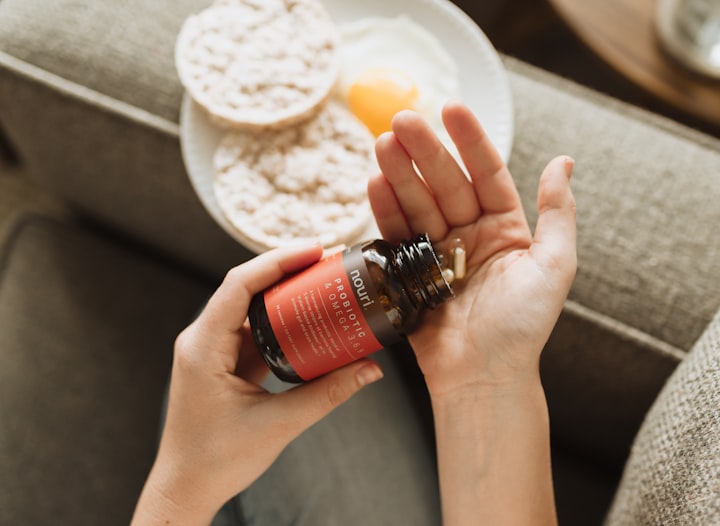Thinking About Starting Supplements?
The questions to ask, things to consider, and how to navigate the supplement world.

Supplements are one of the most common areas I am asked about as a Registered Dietitian - “am I overdoing supplements? Underdoing supplements? Taking the wrong ones? What’s the point of taking a supplement?”
[I want to preface this with a note that if you are ever unsure about supplements you may need or the supplements you’re taking, to chat with a dietitian, pharmacist or GP. This is all super general information, and definitely does not replace individualized nutrition or medical advice.]
Nutrition and nourishment as a term, is the entirety of the ways we obtain energy and nutrients. So this includes things like food and beverages, supplements, and medical liquids such as IVs or tube feeding. Where we get the majority of our nourishment from is dependent on a variety of factors such as digestive function, medical conditions, activity level, preferences, cost and so much more.
Supplements, in a nutshell, serve to fill gaps in the nourishment that comes from other sources. The human body has average requirements for each macronutrient (carbs, proteins, fats) and micronutrients (vitamins and minerals), and it’s possible that even with the regular and adequate consumption of food, we may not meet 100% of our needs. It’s important to note that not meeting our needs fully from food or other nutritional liquids does not mean we absolutely need supplements - the human body works from a big picture and long-term scale, in other words missing out on the recommended intake on one day or a couple days here and there is unlikely to cause severe consequences to your health. Supplements, based on the name, supplement the things we are already getting from other sources or can get from other sources.
How do you know if you need or would benefit from a supplement? Typically this would be assessed by a provider - for myself, in an initial assessment, not only am I gathering more information about your medical history and potential contributors to needs, but I’m also learning about your routine and general eating patterns that can tell me a little more about your nutrition status, and any specific nutrients of concern.
We might choose or be recommended supplements for a variety of reasons. One of them can be limited intake from food throughout a person’s typical eating pattern. An example of this might be protein - if a person isn’t able to eat enough protein, has significant food limitations like allergies or strong preferences, they may decide or be suggested to use a protein supplement. For folks who are active and working on supporting muscle mass growth or maintenance, they may also choose to use a protein supplement because it might be challenging to eat adequate protein without being uncomfortably full between meals and snacks.
We might also be recommended a supplement to treat deficiencies, or an inadequate amount in the body and bloodstream. An example is iron deficiency - iron is important for hemoglobin function, which is a protein that helps the red blood cells carry oxygen through the body. We have normal or expected ranges for many nutrients to be in when it comes to bloodstream, so if a person is under this range, supplementation can be a treatment to help them (again, while they work on food sources as applicable). When we use supplementation to treat an identified and diagnosed deficiency, it’s important that we recheck those levels again after a period of time to make sure it’s actually helping to treat the issue. A supplement that isn’t helping is no longer the appropriate treatment, and a supplement that helped treat the issue isn’t needed for a long period of time.
And we might be recommended supplements because the body isn’t capable of absorbing certain nutrients. For a person with cystic fibrosis, an altered digestive system due to weight loss surgery, or loss of sections of the digestive system due to cancer or other procedures, many nutrients might not absorb adequately, increasing their risk of deficiency. Supplements can be part of a treatment plan along with food and fluids to help a person stay nourished for the long-term.
Other than specific medical reasons to use supplements, there are other things that can influence why we choose supplements.
Healthism is the idea that a person’s health is their sole moral responsibility - essentially being healthy becomes a moral obligation and that the person themselves is the only one in control of this. Healthism teaches us that being unhealthy in any capacity, or not meeting a specific definition of health, makes us less than worthy or even bad people, and that it is our fault that we are ill. Supplements can be influenced by healthism in the sense that they are often marketed as a good decision to prioritize your health, and that they are so easy to include, and if you don’t use supplements you must be actively choosing not to be healthy. There isn’t a single supplement in the world that can guarantee good health, if we can even truly define what health is on a grand scale, and being of a different level of health does not make you a better or worse person. You don’t owe anyone health.
Capitalism is an economic and political system where trade and industry (including healthcare) are controlled by private owners for profit. Consumerism is the protecting and promotion of the interests of the consumers. Both of these things work together to encourage people to purchase supplements - one being that private companies make a profit on the sale of supplements to the public, and the other being that private companies also market specifically to the interests of the public in order to sell their product. For example, using the lens of diet culture to speak through, a company who wants to sell a protein powder will price it at a level that will make them money without being unattainable (that’s a separate issue we can file under “elitism”) to the public and depending on the demands they see in monitoring algorithms and ad response might decide to advertise it as “curbing cravings”, “fat burning” or “metabolism burning”. If they market is as a need to have product for all of these things, people will buy it regardless of whether it does the thing. And the whole cycle rinses and repeats. We can get really critical when we’re selecting supplements on who would benefit the most from us buying them, especially when they’re new and shiny with influencer marketing or really catchy campaigns. And do we need these things in our every day life to feel well and happy?
Thin privilege is also an influence that we might not think about when it comes to supplements. For many thin folks, purchasing a supplement might look like any other shopping. For fat and larger bodied folks, purchasing supplements might bring on unsolicited questions about their health journeys (if they are actively working on one), if they know what they are doing, and to keep up the good work and they will eventually be thin. Purchasing some supplements, especially those that fall under the weight loss category, might also create a proximity or closeness to thinness that may make some people feel safer - if they are actively pursuing weight loss or at least appear to be, they may experience less violence from other people. And the promise of becoming thin when taking a certain supplement may be the thing that keeps people feeling a bit stuck in challenging this influence. This particular influence involves a lot of dismantling in other areas of society, so that all people can buy or not buy supplements at their own informed discretion.
If you decide, either alone or with your medical team, to take a supplement, it’s important to know how to pick one safely.
Generally speaking you will want to use supplements that are third-party tested. Supplements are poorly regulated which means anyone could put almost anything in a bottle and sell it to you. I often like to encourage folks use databases such as NSF Certified for Sport and Informed Sport as these are the databases I am using and other dietitians use when working with high level competitive athletes - if it’s not safe or allowed to be in their bodies, it really shouldn’t be in the public’s! If you order from places like Amazon, find the specific storefront of the brand you are looking to buy from instead of from the general search function. Some storefronts may purchase other products and modify them for selling, which could make them unsafe to take.
If a supplement makes a big claim, like curing cancer, balancing hormones, burning fat or others, it’s a scam. It may also contain contaminants that are drugs or other substances, and may be unsafe.
Check for a Natural Product Number, or NPN number on the container - this is an 8 digit numerical code assigned to approved products for marketing. If it doesn’t have an NPN, look for a DIN or Drug Identification Number. If neither of these are present, it might not be the best choice especially if you are taking a supplement without guidance from a provider.
Make sure there is a way to contact the company on the label - you should be able to reach out with questions and concerns while you take the supplement.
It can be helpful to avoid combination supplements, as this can impact knowing which ingredient could be causing issues, and compounding effects may increase severity of side effects. Try not to start multiple supplements at the same time without talking to a provider.
If a supplement was started on the suggestion or even prescription of a provider, you would take this supplement until either the supplement runs out or the prescription runs out with a plan to retest levels or re-assess your needs. You might be directed differently by your provider so this might look different for everyone - taking a supplement for 6 weeks versus taking a supplement until the bottle is empty.
If you started a supplement on your own, you might decide to take the supplement until it runs out or until it doesn’t feel like a good fit anymore. If you notice negative side effects like severe stomach upset, changes to bowel habits, headaches or migraines, or allergic reaction symptoms, you will want to stop the supplement right away. Keep track of symptoms you experience and be sure to talk to a provider if symptoms don’t resolve or get worse after stopping the supplement. If you’re taking multiple supplements and begin to have negative side effects, it might be best to stop all of them temporarily and gradually add them back to determine which one you might not be tolerating.
You may also stop taking a supplement if it becomes too expensive or the brand changes their flavours and formulations. I know for myself there have been protein powders or pre-workouts that were fantastic but they discontinued my favourite flavour and all of the others were ones I was allergic to.
Supplements can be a helpful tool in our toolbox when it comes to nutrition and wellness, and it’s important to know how to use them so they actually ARE helpful.
About the Creator
Emily the Period RD
I help people with periods navigate menstrual health education & wellness with a healthy serving of sass (and not an ounce of nutrition pseudoscience).






Comments
There are no comments for this story
Be the first to respond and start the conversation.